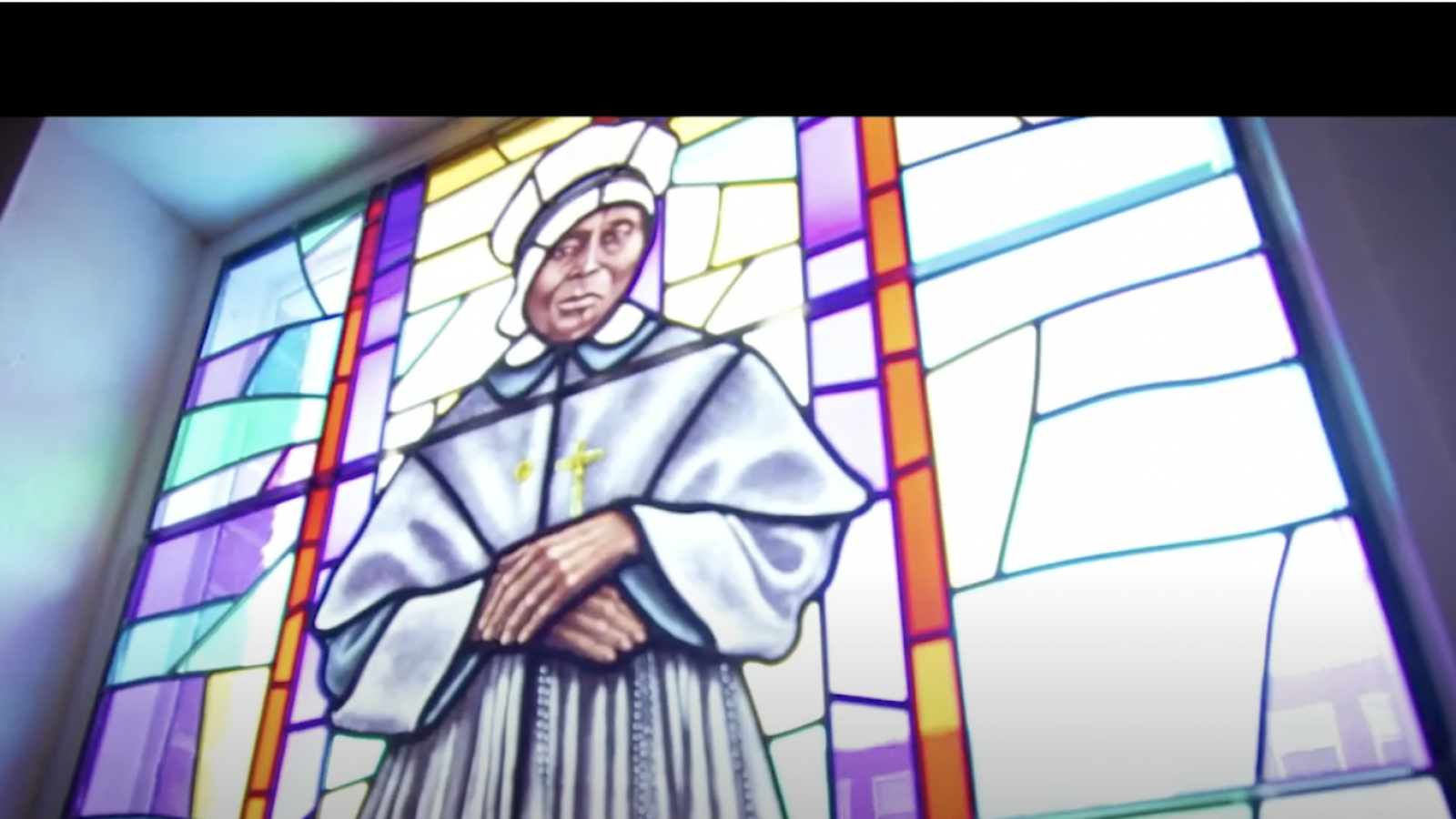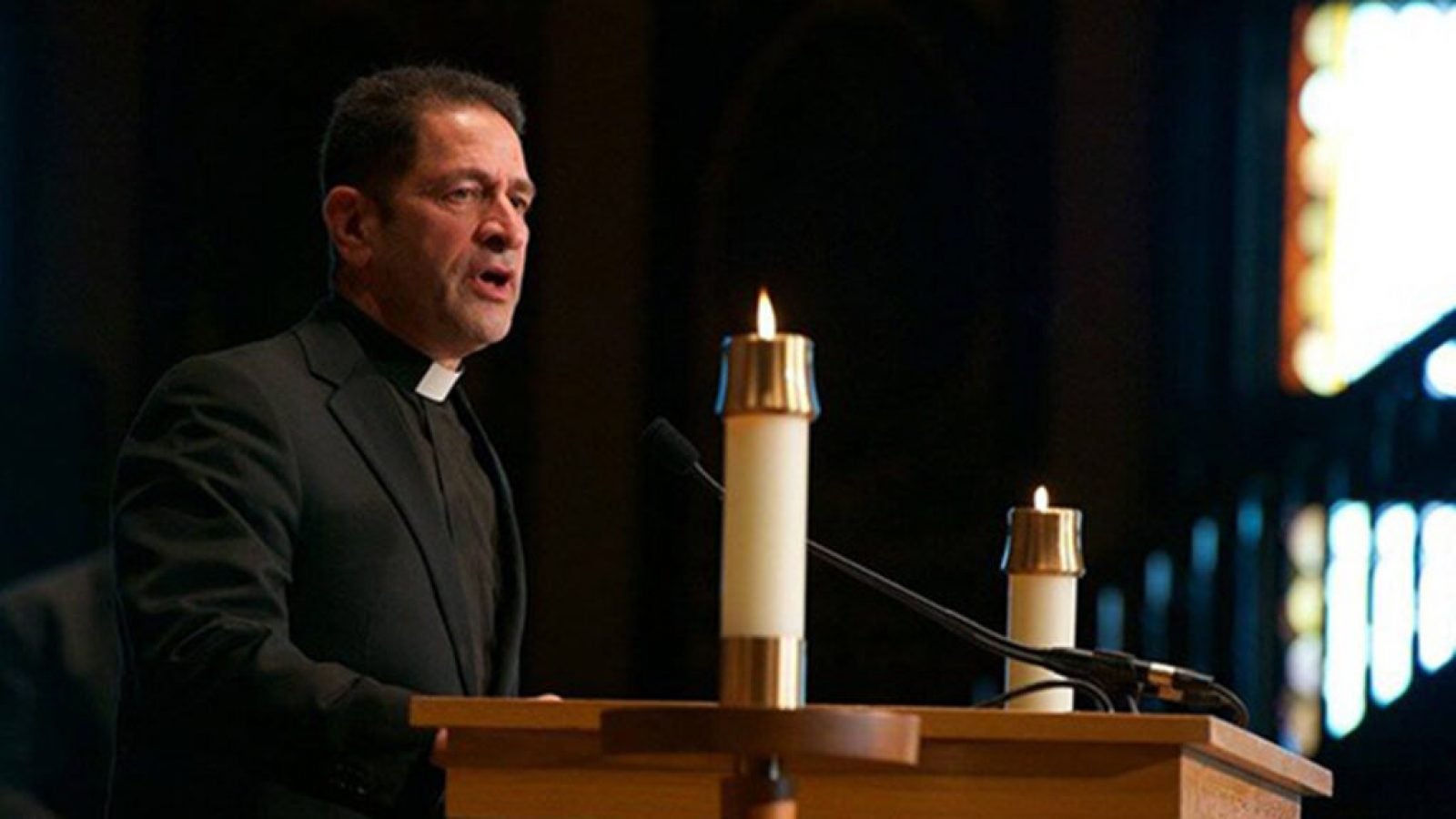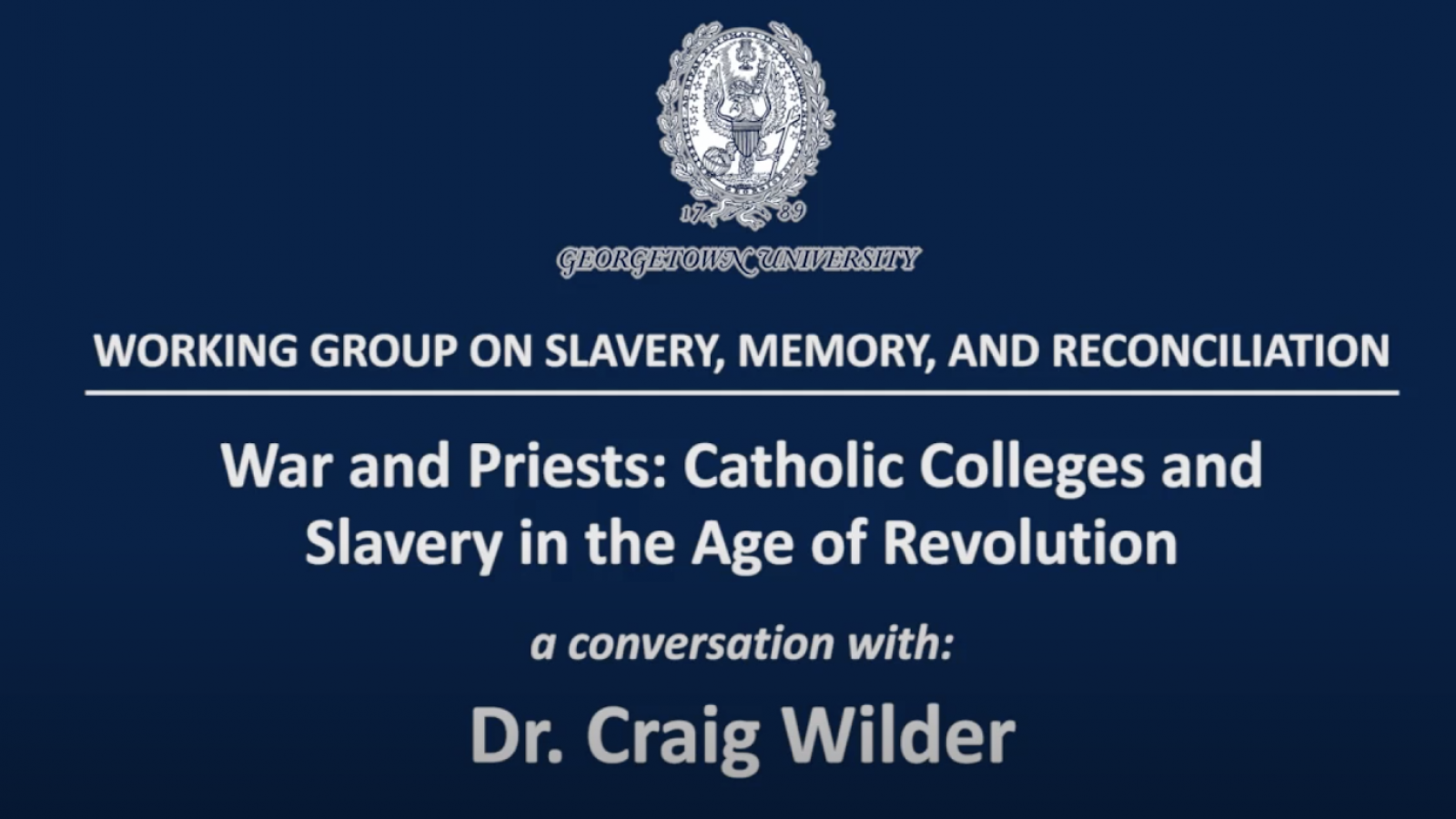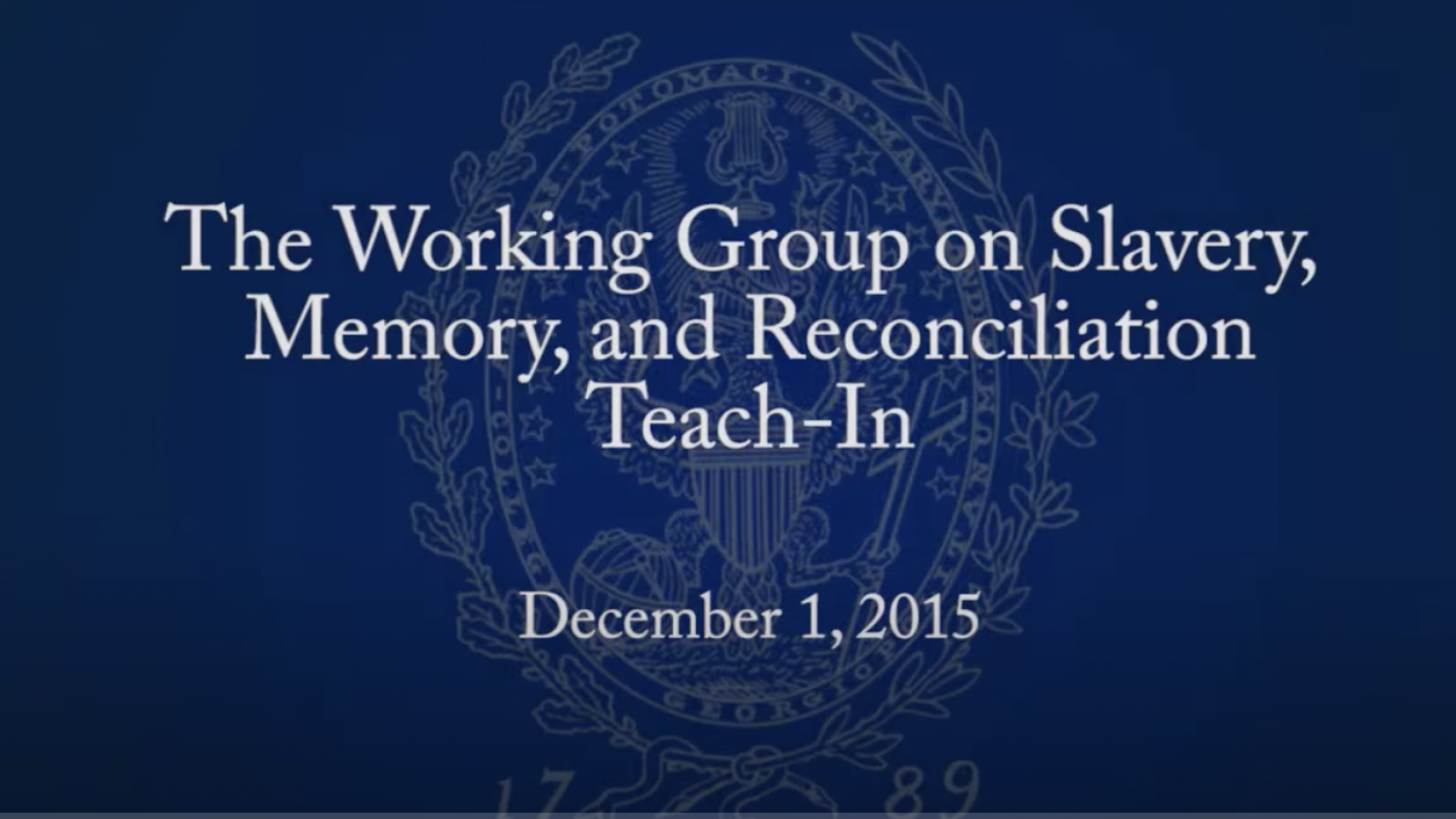Slavery, Memory, and Reconciliation at GU
In September 2015, the University convened the Working Group on Slavery, Memory, and Reconciliation, comprised of students, faculty, staff, and alumni. Over the next year, the Working Group explored the University’s historical relationship to slavery, engaged our community in dialogue, outlined a set of recommendations, and issued a report to guide future efforts.
The University has met with many of the members of the Descendant community whose Ancestors were enslaved on Maryland Jesuit plantations in the 18th and 19th centuries. After many conversations with Descendants about how to pursue a shared way forward, at the request of Descendant leaders in 2018, the Society of Jesus, Georgetown University, and Descendants began a process of dialogue, with the support of the W.K. Kellogg Foundation. The process is anchored in the practice of trust-building, truth-telling, racial healing, and transformation. These conversations are continuing in constructive and fruitful directions.
In April of 2017, Georgetown held a special Liturgy of Remembrance, Contrition, and Hope in partnership with the Society of Jesus, and the Archdiocese of Washington. At this Liturgy, the University and the Society of Jesus offered an apology for the 1838 sale of 272 enslaved children, women, and men. On the same day, the University also dedicated two buildings on its main campus: Isaac Hawkins Hall and Anne Marie Becraft Hall. More than 100 Descendants attended these gatherings.
Georgetown has also launched a related set of efforts to strengthen the University’s commitment to racial justice with the creation of the Department of African American Studies in 2016, the hiring of new faculty, and a faculty group charged with setting the foundation for an Institute for the Study of Racial Justice.
Back to TopUniversity History
Georgetown has been engaged in ongoing work to research, digitize, and share the history of slavery and segregation related to Georgetown and the Maryland Jesuits. The Working Group on Slavery, Memory, and Reconciliation prepared a synopsis of its historical study as part of their 2015-2016 report.
Georgetown librarians, archivists, faculty, graduate and undergraduate student researchers are working to expand digital resources and what we know about slavery at Georgetown.
New findings can be located on the Georgetown Slavery Archive (GSA), which was launched in February 2016. The GSA has uploaded more than 365 archival materials that have been accessed by more than 50,000 users throughout nearly 100,000 sessions.
Additional resources, including videos and recommended readings, are updated regularly.
Back to TopFeatured Videos
Events and speakers have examined the history of slavery and its connection to Georgetown and the higher education community. See below for videos from some of these events.
Back to TopFurther Reading
If you are interested in learning more about slavery, memory, and reconciliation at Georgetown, throughout higher education, and around the country, we recommend the following readings. Please check back regularly for additions and updates.
Beckett, Edward. S.J. “Listening to Our History: Inculturation and Jesuit Slaveholding.” Studies in the Spirituality of Jesuits 28/5 (November 1996): 1-48.
Berlin, Ira. “American Slavery in History and Memory and the Search for Social Justice.” The Journal of American History 90 (2004): 1251-1268.
Clarke, Max and Gary Alan Fine. “‘A’ for Apology: Slavery and the Collegiate Discourses of Remembrance – the Cases of Brown University and the University of Alabama.” History and Memory 22 (2010): 81-112.
Collins, David. “Georgetown, Jesuits, Slaveholding.” The Hoya February 9, 2015. Web.
Curran, Robert Emmett. “‘Splendid Poverty’: Jesuit Slave Holdings in Maryland, 1805-1838.” In Catholics in the Old South. Edited by Randall M. Miller and Jon L. Wakelyn. Macon, Georgia: Mercer University Press, 1983.
Curran, Robert Emmett. “Building a College and More.” In The Bicentennial History of Georgetown University: From Academy to University, 107-130. Washington: Georgetown University Press, 1993.
Jackson, Maurice. “Washington, DC: From the Founding of a Slaveholding Capital to a Center of Abolitionism.” Journal of African Diaspora Archaeology & Heritage 2.1 (May 2013): 40-66.
Kolchin, Peter. “Slave Life” and “The White South.” In American Slavery, 1619-1877, 133-199. New York: Hill and Wang, 1993.
Menzie Lesko, Kathleen, Valerie Babb, and Carroll R. Gibbs. Black Georgetown Remembered: A History of Its Black Community From the Founding of “The Town of George” in 1751 to the Present Day. Washington, DC: Georgetown UP, 2016.
- Preface and Chapter 1 recommended
- See details on the event celebrating the book’s 25th anniversary
Murphy, Thomas, S.J. Jesuit Slaveholding in Maryland, 1717-1838. Studies in African American History and Culture. New York: Routledge, 2001.
Quallen, Matthew. “Georgetown, Financed by Slave Trading.” The Hoya September 26, 2014. Web.
Quallen, Matthew. “Jesuit Ideals Facing the Slave Trade.” The Hoya January 16, 2015. Web.
Quallen, Matthew. “Slavery Inextricably Tied to Georgetown’s Growth.” The Hoya October 23, 2015. Web.
Quallen, Matthew. “Slavery’s Remnants, Buried and Overlooked.” The Hoya September 11, 2015. Web.
Quallen, Matthew. “Beyond the 272 Sold in 1838, Plotting the National Diaspora of Jesuit-Owned Slaves.” The Hoya April 30, 2016. Web.
Wilder, Craig Steven. Ebony and Ivy: Race, Slavery, and the Troubled History of America’s Universities. New York: Bloomsbury Press, 2013.
- Read The New York Times‘ review of Ebony and Ivy.
- Read the Journal of Southern History‘s review of Ebony and Ivy.
Working Group and Report
In August of 2015, Georgetown University launched a new effort to reflect on, engage with, and learn from its historic ties to slavery. The Working Group on Slavery, Memory, and Reconciliation was appointed and charged by Georgetown University President John J. DeGioia in September to study and make recommendations to help guide the University’s ongoing work related to slavery and its legacies.
The Working Group created a new public digital archive of historical documents, conducted archival research on the ancestors who were enslaved, connected with their descendants, and hosted community dialogues and events, including a week-long symposium of events, performances, lectures, tours, and reflections in honor of D.C. Emancipation Day.
In November of 2015, the Working Group made its first formal recommendation to the University, recommending the interim renaming of Mulledy Hall and McSherry Hall as Freedom Hall and Remembrance Hall. This recommendation was accepted by the University. The Working Group continued to solicit input from the community as it developed its report and recommendations. Its report and recommendations were completed in the summer of 2016 and can be viewed here.
President DeGioia, along with the members of the Working Group, shared the report with the Georgetown community on September 1, 2016.
THE WORKING GROUP ON SLAVERY, MEMORY, & RECONCILIATION
Fr. David Collins, S.J., Ph.D. (chair)
Ayodele Aruleba (C’17)
Fr. Matthew Carnes, S.J., Ph.D.
Marcia Chatelain, Ph.D.
Haben Fecadu, J.D. (F’08)
Carolyn Forché, M.F.A.
Maurice Jackson, Ph.D. (G’95, G’01)
Rosemary Kilkenny, J.D. (L’87)
Connor Maytnier (C’17)
Fr. Kevin O’Brien, S.J., J.D. (C’88)
Matthew Quallen (F’16)
Adam Rothman, Ph.D.
Daviree Velázquez, M.Ed.
Chris Wadibia (C’16)
Crystal Walker (F’16)
Eric Woods (B’91)



